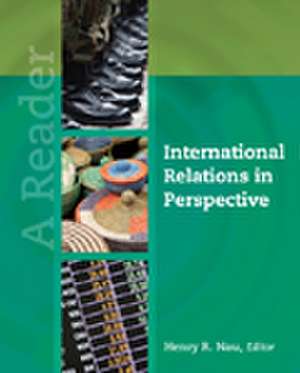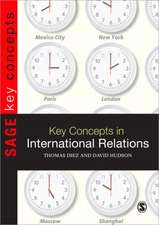International Relations in Perspective: A Reader
Editat de Henry R. Nauen Limba Engleză Paperback – 14 dec 2009
Preț: 721.44 lei
Preț vechi: 988.28 lei
-27% Nou
Puncte Express: 1082
Preț estimativ în valută:
138.11€ • 142.04$ • 114.58£
138.11€ • 142.04$ • 114.58£
Carte tipărită la comandă
Livrare economică 15 februarie-01 martie
Preluare comenzi: 021 569.72.76
Specificații
ISBN-13: 9781604269932
ISBN-10: 1604269936
Pagini: 768
Dimensiuni: 191 x 232 x 45 mm
Greutate: 1.13 kg
Ediția:Revised.
Editura: SAGE Publications
Colecția CQ Press
Locul publicării:Washington DC, United States
ISBN-10: 1604269936
Pagini: 768
Dimensiuni: 191 x 232 x 45 mm
Greutate: 1.13 kg
Ediția:Revised.
Editura: SAGE Publications
Colecția CQ Press
Locul publicării:Washington DC, United States
Cuprins
The Dilemma of Scientific Man
Japan, Asian-Pacific Security, and the Case for Analytical Eclecticism
Chapter 1: How to Think About International Relations: Perspectives and Levels of Analysis
The Realist Critique
Realism and Complex Interdependence
Anarchy Is What States Make of It: The Social Construction of Power Politics
Karl Marx
Thoroughly Modern Marx: Lights. Camera. Action. Das Kapital. Now.
The Level-of-Analysis Problem in International Relations
Chapter 2: Perspectives on World History: Change and Continuity
Historical Reality vs. Neo-realist Theory
The Fragmentation and Consolidation of International Systems
Intervention and International Order
Chapter 3: World War I: World on Fire
The Coming of the First World War: A Reassessment
The July Crisis and the Outbreak of World War I
Chapter 4: World War II: What Did War Happen Again?
The 1930s and the Origins of the Second World War
Selections from President Roosevelt and the Coming of the War, 1941: A Study in Appearances and Realities
Chapter 5: The Origins and End of the Cold War
The Long Telegram
Telegram from the Soviet Ambassador to the United States, to the Soviet Leadership
Reagan, Gorbachev, and the Completion of Containment
Deterrence and the End of the Cold War
Chapter 6: From 11/9-9/11: The World of the 1990s
The End of History?
The Clash of Civilization?
Great Power Politics in the Twenty-first Century
Chapter 7: Terrorism and the World after 9/11
Feminist Perspectives on 9/11
How Baida Wanted to Die
What China Will Want: The Future Intentions of a Rising Power
Us and Them: The Enduring Power of Ethnic Nationalism
Separatism's Final Country
Chapter 8: History of Globalization: Mercantilism, Pax Britannica, and Pax Americana
Dominance and Leadership in the International Economy: Exploitation, Public Goods, and Free Rides
Economic Interdependence and National Security in Historical Perspective
Chapter 9: How Globalization Works in Practice
The "Magic" of the Market
Selections from "Has Globalization Gone Too Far?"
Chapter 10: Trade, Investment, and Finance: Engines of Growth
The Economics of QWERTY
Global Imbalances and the Financial Crisis
Chapter 11: Miracle and Missed Opportunity: Development in Asia and Latin America
From Miracle to Crisis to Recovery: Lessons from Four Decades of East Asian Experience
An Empty Revolution: The Unfilled Promises of Hugo Chavez
Chapter 12: Foreign Aid and Domestic Governance: Development in Africa and the Middle East
Towards the Rise of Women in the Arab World: Concepts and Problematic Issues
Is Africa's Economy at a Turning Point?
The Making, and Unmaking, of a Child Soldier
Chapter 13: Global Inequality, Imperialism, and Injustice: A Critical Theory Perspective
Carmen Miranda on My Mind: International Politics of the Banana
Dependent Capitalist Development in Latin America
Chapter 14: World Environment: Population, Pollution and Pandemics
Selection from "An Inconvenient Truth"
Is Humanity Losing the Global Warming Debate?
Chapter 15: Global Civil Society: Nonstate Actors and Basic Human Rights
Selection from "A New World Order"
Transitional Justice: Criminal Courts and Alternatives
Chapter 16: Global Governance: International and Regional Institutions
The Challenges of Global Governance
Regional Orders
Conclusion: Applying Perspectives and Levels of Analysis: The Case of the Democratic Peace
The Kantian Peace in the Twenty-First Century
Japan, Asian-Pacific Security, and the Case for Analytical Eclecticism
Chapter 1: How to Think About International Relations: Perspectives and Levels of Analysis
The Realist Critique
Realism and Complex Interdependence
Anarchy Is What States Make of It: The Social Construction of Power Politics
Karl Marx
Thoroughly Modern Marx: Lights. Camera. Action. Das Kapital. Now.
The Level-of-Analysis Problem in International Relations
Chapter 2: Perspectives on World History: Change and Continuity
Historical Reality vs. Neo-realist Theory
The Fragmentation and Consolidation of International Systems
Intervention and International Order
Chapter 3: World War I: World on Fire
The Coming of the First World War: A Reassessment
The July Crisis and the Outbreak of World War I
Chapter 4: World War II: What Did War Happen Again?
The 1930s and the Origins of the Second World War
Selections from President Roosevelt and the Coming of the War, 1941: A Study in Appearances and Realities
Chapter 5: The Origins and End of the Cold War
The Long Telegram
Telegram from the Soviet Ambassador to the United States, to the Soviet Leadership
Reagan, Gorbachev, and the Completion of Containment
Deterrence and the End of the Cold War
Chapter 6: From 11/9-9/11: The World of the 1990s
The End of History?
The Clash of Civilization?
Great Power Politics in the Twenty-first Century
Chapter 7: Terrorism and the World after 9/11
Feminist Perspectives on 9/11
How Baida Wanted to Die
What China Will Want: The Future Intentions of a Rising Power
Us and Them: The Enduring Power of Ethnic Nationalism
Separatism's Final Country
Chapter 8: History of Globalization: Mercantilism, Pax Britannica, and Pax Americana
Dominance and Leadership in the International Economy: Exploitation, Public Goods, and Free Rides
Economic Interdependence and National Security in Historical Perspective
Chapter 9: How Globalization Works in Practice
The "Magic" of the Market
Selections from "Has Globalization Gone Too Far?"
Chapter 10: Trade, Investment, and Finance: Engines of Growth
The Economics of QWERTY
Global Imbalances and the Financial Crisis
Chapter 11: Miracle and Missed Opportunity: Development in Asia and Latin America
From Miracle to Crisis to Recovery: Lessons from Four Decades of East Asian Experience
An Empty Revolution: The Unfilled Promises of Hugo Chavez
Chapter 12: Foreign Aid and Domestic Governance: Development in Africa and the Middle East
Towards the Rise of Women in the Arab World: Concepts and Problematic Issues
Is Africa's Economy at a Turning Point?
The Making, and Unmaking, of a Child Soldier
Chapter 13: Global Inequality, Imperialism, and Injustice: A Critical Theory Perspective
Carmen Miranda on My Mind: International Politics of the Banana
Dependent Capitalist Development in Latin America
Chapter 14: World Environment: Population, Pollution and Pandemics
Selection from "An Inconvenient Truth"
Is Humanity Losing the Global Warming Debate?
Chapter 15: Global Civil Society: Nonstate Actors and Basic Human Rights
Selection from "A New World Order"
Transitional Justice: Criminal Courts and Alternatives
Chapter 16: Global Governance: International and Regional Institutions
The Challenges of Global Governance
Regional Orders
Conclusion: Applying Perspectives and Levels of Analysis: The Case of the Democratic Peace
The Kantian Peace in the Twenty-First Century












